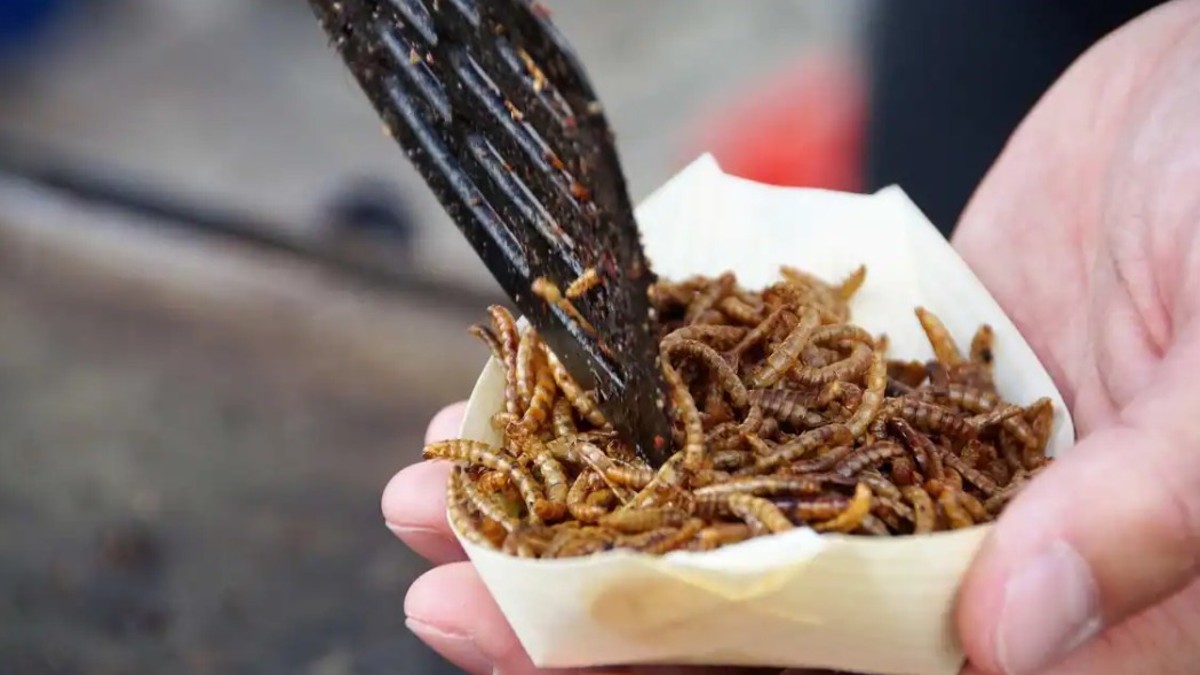Certain edible insects could soon appear on Singapore’s supermarket shelves and restaurant tables.
The State Food Agency (SFA) has approved 16 species of edible insects for sale and consumption in the city-state, according to a July 8 public circular addressed to food traders.
It has also developed an insect regulatory framework that establishes guidelines for the same.
Here’s what we know about it.
Insects on plate in Singapore
The SFA said, “With immediate effect, SFA will allow the import of insects and insect products belonging to species that have been assessed to be of low regulatory concern.”
Insects approved by the agency include locusts, grasshoppers, mealworms, and several species of beetles, reported CNN.
“These insects and insect products can be used for human consumption or as animal feed for food-producing animals,” the agency said. It added that insects could not be “harvested from the wild.”
According to News Asia, the agency first conducted a public consultation on the regulation of insects and insect products at the end of 2022.
16 bug species were supposed to be approved for consumption in the second half of 2023, according to an announcement made by the agency in April of last year, but the decision was delayed.
SFA stated earlier this year that it was completing the implementation details and planned to create a regulatory framework in the first half of this year in a forum letter reply published in The Straits Times.
Impact Shorts
More ShortsEating insects is still unusual in Singapore, as it is in much of the world. Live insects are frequently offered for sale in the city-state as pet food for creatures like songbirds and reptiles.
Insects have been served safely in a variety of ways by local chefs, restaurants, and food and beverage firms in products including protein bars and salted egg crabs with superworms, according to CNN.
Also read: Are crickets healthy food? Why does a Canadian mother feed them to her 18-month-old baby?
Regulatory framework
“As the insect industry is nascent and insects are a new food item here, SFA has developed an insect regulatory framework which puts in place guidelines for insects to be approved as food,” SFA said. Businesses that want to import, cultivate, or transform insects into food or animal feed must abide by these rules.
“Documentary proof (is needed to show) that insects are farmed in premises regulated by the Competent Authority,” SFA said.
According to News Asia, the agency adds that the species of insects must be evaluated for past human consumption, pollutants cannot be used during farming or processing of insects or insect products, and insects cannot be collected from the wild.
If the insects are not part of the 16 authorised species, they must be evaluated to ensure safe human consumption.
While there are currently no international standards for the sale and consumption of insects as food or animal feed, SFA’s guidelines “are developed following a thorough scientific review taking reference from countries and regions that have allowed the consumption of certain insects as food.”
‘Overlooked source of protein’
More than 2,100 edible species of insects have been identified by researchers.
According to CNN, many of these are rich in essential vitamins and minerals and provide a sustainable, high-protein alternative to cattle that produce methane. Livestock is responsible for 14.5 per cent of all greenhouse gas emissions worldwide, according to the United Nations Food and Agricultural Organisation (FAO).
“Insects are an overlooked source of protein and a way to battle climate change,” according to a 2022 report by the World Economic Forum.
“Our consumption of animal protein is the source of greenhouse gas and climate change. (Consuming) insects can offset climate change in many ways,” researchers said.
Last year, Dailymail quoted Venus Kalami, a board-certified pediatric dietitian and nutritionist at Solid Starts, as saying that bugs are indeed “packed with key nutrients like high-quality protein, essential fatty acids, minerals like iron (some have more than beef) and zinc, vital B vitamins, and more.”
Popularity in other countries
Some regions of Mexico consider grasshopper tacos to be a delicacy.
In Thailand and Cambodia, among other Southeast Asian nations, ants, crickets, and even tarantulas are frequently consumed.
Certain insect species that meet multiple nutritional requirements are permitted for food by the European Union as well as nations including Australia, New Zealand, South Korea, and Thailand.
Companies that sell pre-packaged food items with insects as a component are required to write the “true nature of the product” on the product packaging.
With inputs from agencies
)